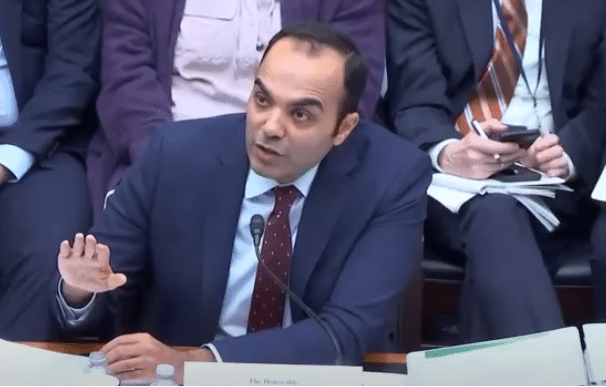December 5, 2023
Permission to republish original opeds and cartoons granted.
Biden's CFPB Director Wants You To Pay For Late Credit Card Payers

By Rick Manning
Imagine a regulatory body of the United States government deciding that people who pay their bills should subsidize those who don’t.
Well, imagine no more. The constitutionally dubious Consumer Financial Protection Board (CFPB) has a proposed rule (Regulation Z) that would lower the penalty fee for failing to pay credit card debt on time from $30 to $8. While this may seem like a good thing, it actually would have the perverse effect of shifting the burden to cover late costs to the broader consumer through higher interest rates.
In a recent hearing with the CFPB Director Rohit Chopra, U.S. Rep. Ann Wagner (R-Mo.) asked him, “why should responsible cardholders, who pay their bills on time and typically never pay late fees, be forced to subsidize frequent late payers?”
Wagner further pointed to the actual proposed rule which says that the 74 percent of all Americans with credit cards who never pay a late fee, could experience “higher maintenance fees and lower rewards.”
What could go wrong with a regulation where those who do the right thing get punished to benefit those who don’t?
Unfortunately, a lot can go wrong.
Smaller banks are particularly vulnerable as many of them have been under extreme financial pressure since the failure of Silicon Valley Bank earlier this year. Federal law requires that small businesses have unique protections against a regulation that would do significant economic damage to a substantial number of them.
The Office of Advocacy of the U.S. Small Business Administration is arguing to the CFPB that this regulation does real harm to smaller banks and credit unions and is formally protesting the CFPB decision to disregard this harm as speculation which did not command a factual foundation.
Given Treasury Secretary Janet Yellen’s mid-November warning that more bank mergers may necessary in the wake of regional bank failures, prudence demands that the CFPB not exacerbate the financial pressures on smaller banks through a consumer cost shifting scheme that does direct harm to those institutions which are most vulnerable to the Biden administration’s high interest rate policy.
Beyond the unintended consequence of a likely increased consolidation of the banking industry due to the CFPB’s ill-conceived regulation, the core philosophical issue remains, the regulatory punishment of those who pay their bills to alleviate negative consequences for those who don’t.
Senator Steve Daines (R-Mont.) posed exactly the right question to Chopra in a recent hearing, “So, my question is, why would your agency proceed with a rule they would potentially cause hardship to those it actually seeks to help?”
The obvious answer is that they don’t care about the vast majority of consumers, instead focusing only on scoring points with a select group in the hopes of gaining political favor in November. Consequences to consumers and smaller banking institutions be damned.
Rick Manning is the President of Americans for Limited Government Foundation.
To view online: https://dailytorch.com/2023/12/bidens-cfpb-director-wants-you-to-pay-for-late-credit-card-payers/
Video: Biden Is Waging The Real War On Democracy

To view online: https://www.youtube.com/watch?v=5ZRODxqoqsY
Will House Republicans be able to defund ESG this year?

By Robert Romano
“Anti-woke economic terrorists have now wiped out $5 trillion in stock value.”
That was a headline from Afru.com bemoaning the sideways performance of Environmental, Social and Governance (ESG) funds the past year or so, accusing anyone opposed to ESG with inflicting “economic terrorism” and “erod[ing] financial portfolios of color” as “global investments in ethical companies have nosedived by nearly $5 trillion over the past two years.”
One of my favorite parts about my job is reading hysterical headlines and pieces, and offering responses, so here goes.
Even if Republicans were economic terrorists—they aren’t, but even if they were—they’re not very good at it.
From the Afru article, it lays the blame singularly at Republican lawmakers’ feet and a few anti-woke voices on social media such as Tim Pool, Joe Rogan and Elon Musk.
Since social media activism, while very important at educating and raising awareness of ESG and its impacts on the economy and our culture, clearly cannot be a driving force for global financial gyrations, here’s the very brief summary Afru.com offers:
“Let’s be clear about where to put the blame. Conservative lawmakers, driven by an irrational culture of anti-woke hysteria, have actively taken measures to resist the incorporation of ESG principles into business and investing. This opposition has manifested in legislative efforts across multiple states, from Florida to Utah, where lawmakers are pushing back against the injection of ethics into the financial sector.”
So, in terms of policy (which I'll argue in a moment is critical to the approach that must be taken), the authors singularly lay the sideways performance at the feet of red states’ pension funds reportedly divesting from ESG funds.
However, Afru.com needn’t have fretted as it is unclear to what extent red states' government pension funds in states like Utah and Florida were really ever the driving force behind investment in this category. The states that were actively reporting as participating in ESG are California, New York, Colorado, Connecticut, Maine, Maryland and Oregon, according to the National Association of State Retirement Administrators. Are those states withdrawing from ESG funds? That’d be news, but I somehow missed that headline.
As for the red states blocking investments, that’s certainly important, but to the extent they were never the driving force behind such investments to begin with, it would be a lot like New York Yankees fans boycotting New York Mets paraphernalia they were never going to buy in the first place.
Further, in terms of investment, Morningstar's sustainable assets index was at $299 billion for Q3 2023, about where it was in Q1 2021. It's down 17 percent from its peak at the end of 2021. The S&P 500 was down 10 percent from its peak at the end of 2021 through the end of Q3 2023 (it's recovered some in the past month). So, while there are differences in performance that are certainly worth considering from an investment standpoint, the hysterical point of view expressed by the Afru.com authors doesn't match the reality, especially when one considers the policies that have and have not been enacted.
Former President Trump (whom I personally support) was convinced his Labor Department "banned" ESG in 2020 but they hadn't as the rule in question only covered one-third of retirement investments and still allowed ESG. I covered this exhaustively in February in a piece, “Trump vows ban on $8.4 trillion ESG juggernaut that is violating federal antitrust laws by halting expansion of U.S. energy production and violating Title VII of Civil Rights Act with racial, gender hiring quotas.”
In the above piece, I suggested a more comprehensive approach be taken in the next administration, looking at tax-deferred savings in Individual Retirement Accounts (IRAs) but also Title VII of the Civil Rights Act violations and antitrust considerations. I wrote all of that down because I actually have somewhat low confidence that the next Republican administration, regardless of the candidate, will be able (or willing) to do much. Why?
For example, provisions in two upcoming appropriations bills would if enacted defund Labor Department regulations allowing employer-based retirement investments into Environmental, Social and Governance (ESG) funds, prohibit federal employee retirement investments by the $800 billion Thrift Savings Plan into ESG funds and would defund implementation of the Securities and Exchange Commission’s Climate Disclosure Rule.
The two bills are the House Labor and Health and Human Services appropriations bill, or H.R. 5894 and the House Financial Services appropriations bill, or H.R. 4664.
Anecdotally, having examined legislation for 15 years, in terms of defunding harmful regulations, the bills that House Republicans have come up with this year are the best I've ever seen. They gut large chunks of the administrative state.
Unfortunately, they are apparently still not good enough for some House members, and so are still languishing on the House floor and might not pass. They may yet, but there is very little incentive for House Speaker Mike Johnson (R-La.) to bring spending bills to the floor only to be shot down by members.
Add to the mix that Republicans have also eliminated the possibility of an omnibus bill (a combination of appropriations bills) this year that very well could have via a horse trading process possibly included the provisions I'm highlighting, and so we are headed almost certainly for another continuing resolution that will guaranteed if it's a continuing resolution contain none of them.
In other words, Republicans in Washington, D.C. have not enacted a single policy, law or regulation that would have much of an impact on this. Even if one wishes to point to the 2020 Trump Labor regulation that I believe is inadequate because ERISA is an inadequate vehicle to address this issue because it only impacts one-third of the retirement savings market that re-implemented the "all things being equal" test, it has already been rescinded and replaced by President Joe Biden Biden, never taking effect.
At this point, Republicans appear to be relying on a few state Attorneys General and think tanks to litigate against ESG in federal courts on antitrust and Civil Rights Act grounds, which is an important feature of an overall strategy, but which might not ultimately wrap up for about a decade or so.
In the meantime, the current sideways markets will eventually recover as the strong dollar turns into a weaker dollar and the Federal Reserve begins increasing liquidity by lowering interest rates, I'd say within a year or so, and the current capital being sidelined will be put right back into play because Wall Street actually doesn't have a preference, as long as the investments ultimately go up.
Perhaps it keeps troops organized and on the field and courageous to believe things that demonstrably aren't true.
Obviously, my focus is on policy because I believe government incentives and subsidies have a lot to do with how ESG seems to have such a disproportionate impact in our economy and culture. And on the policy front, so far, I am very pessimistic about the prospects of passage of a single anti-ESG measure on the national level any time soon.
The current economic slowdown was an opportunity to stick a thousand knives in this monster while it was on its back. But Afru.com need not worry too much, the policies I am outlining do not appear to be in any danger of passing any time soon.
Instead, the SEC's climate disclosure rule, Biden's Labor Department pro-ESG rule and investments by the Thrift Savings Plan into ESG continue unabated, soon markets will recover and activists and lawmakers will still be complaining about carbon energy rationing, carbon and social credit scores and woke movies and entertainment.
I’d love to be wrong about all of this, but I don't think the invisible hand of the markets will be enough to stop this. I hope it is, but Congress’ job, assuming members wish to address this in any comprehensive manner whatsoever, is to help that along. But the truth is, Republicans are not much further along than they were about two or three years ago. Markets are sideways now, but will recover and reconstitute themselves very soon, and the question will rightly revert back to which policies, if any, need to be implemented. We’ll see.
Robert Romano is the Vice President of Public Policy at Americans for Limited Government.
To view online: https://dailytorch.com/2023/12/will-house-republicans-be-able-to-defund-esg-this-year/


Bill Ackman: Harvard must ‘address the antisemitism that has exploded on campus’
Dear President Gay,
Since my letter to you of November 4th to which you did not reply or even acknowledge, I have received substantial feedback and input from senior members of the Harvard faculty about a number of the issues I raised in my letter concerning free speech, antisemitism, and the impact of the Office of Equity, Diversity, Inclusion and Belonging (OEDIB) at Harvard. I thought to share this feedback with you now as it may inform your testimony and potential questions you may receive from the Congress on Tuesday.
Free Speech at Harvard
In several of your communications since October 7th, you have emphasized Harvard’s commitment to free speech as the reason why the university has continued to permit eliminationist and threatening language on campus – i.e., calls for Intifada (suicide bombings, knifings, etc. of Israeli civilians) and the elimination of the state of Israel “From the River to the Sea.” You explained your tolerance for these protests on October 13th: “[O]ur university embraces a commitment to free expression. That commitment extends even to views that many of us find objectionable, even outrageous.”
In my letter to you, however, I noted that In The Foundation for Individual Rights and Expression (FIRE) Free Speech Rankings, Harvard has consistently finished in the bottom quartile in each of the past four years. I note that Harvard’s ranking has deteriorated each year, receiving its lowest free speech ranking ever for the 2023 academic year, last out of 254 universities with a rating of 0.00, the only university with an “abysmal” speech climate.
After sending my letter, I reached out to the faculty to reconcile your free speech absolutist commitment with Harvard having the lowest free speech ranking of any university. The faculty had a lot to say on this issue, as well as on antisemitism and the OEDIB. Notably, they were willing to share their views so long as I committed to keep their identities confidential. I have quoted their remarks below:
On Free Speech
“Years ago, Harvard stopped being a place where all perspectives were welcome.”
“Harvard is a place where loud, hate-filled protests appear to be encouraged, but where faculty and students can’t share points of view that are inconsistent with the accepted narrative on campus.”
“Harvard became a place where if you toed the party line, there was applause. If you disagree, you are drowned out. The gatekeepers of speech continue to further narrow what they deem acceptable speech.”
“The primary problem with speech at Harvard is that if you say the wrong thing, you will be cancelled, which leads to self-censorship. The result is what you actually think is not what you say.”
“Saying anything that doesn’t highlight the importance of slavery and colonialism as animating forces of history is not acceptable speech. Lived experience and ideology become the dominant forces of conversation. All of the courses follow the same playbook ideology. Ideology poses as coursework.”
On Antisemitism, Support for Hamas, and the Protests Against Israel
When I asked members of the faculty about the causes behind the Israeli/Gaza protests and the tolerance for antisemitism on campus, they explained:
“Whiteness at Harvard is deemed fundamentally oppressive. Indigenous peoples are presented as in need of justice and reparations. Jews are presented as white people. It is therefore ok to hate Israel and Jews as they are deemed to be oppressors.”
I asked: “Why are the protests only about Israel versus other conflicts in the Middle East and around the globe where Palestinians and other civilians were killed?”
“Israel is the rare case where we have a hot conflict between people that are deemed ‘white’ versus people of color.”
The Office of Diversity, Equity, Inclusion and Belonging (ODEIB)
“The primary animating force of the ODEIB is racism-colonialism and the denial of indigenous rights. The ODEIB is a home for people who are perceived to have been victimized.”
“The ODEIB was meant to include Asians, but it does not. It is focused on communities that experienced colonialism.”
“Recency matters. India is not included because they got autonomy 70 years ago.”
“The ODEIB is at the service of black students, to a lesser extent brown students, and to a lesser extent LGBTQ students.” “It’s about whiteness versus people of color.”
“The DEI framework prioritizes people on the oppressed side of the narrative.”
Hiring Practices at Harvard
One topic which emerged when I spoke to the faculty was the issue of hiring at Harvard, an issue about which the faculty clearly has a lot of consternation.
When I asked why Harvard’s faculty has shifted sharply leftward in recent years, they explained:
“Each department decides whom they want, and the university can accept or reject the candidate. Left-leaning faculty appoint other left-wing faculty because they get to decide whom to hire and promote. It’s a bit like the Twitter algorithm which continues to feed you the points of view you want to hear. Eventually, each department reaches the tipping point.”
One senior member of the faculty shared that it is made abundantly clear that they cannot hire new faculty members unless they meet ODEIB requirements. That is, the candidate has to be a woman, person of color, or have LGBTQ+ status. Straight white males are “off the table.” Asians and those of South Asian (i.e., India) heritage are similarly disadvantaged in the process as they are deemed successful, overachieving minorities.
A number of the faculty bemoaned that in many cases they cannot hire the substantially more qualified person if he is a white or Asian straight male as the proposed candidate “has to be a woman or BIPOC person.” I was told that behind closed doors, it is common to hear: “I clearly don’t think this is the strongest candidate, but we can see where the train is headed. I therefore have no choice but to vote for the [lesser-qualified candidate.]”
It is made clear to the faculty that Harvard’s discriminatory approach to hiring should never be acknowledged or written about in an email. One professor said that he has been continually amazed that no one has brought a lawsuit as these practices are clearly illegal.
One faculty member explained that it is not just the administration that has been putting forth these requirements, but that external organizations like The Chronicle of Higher Education (TCHE) do “investigative reporting” where they do racial and gender audits of university departments. TCHE publicly scolds university departments that don’t meet their diversity requirements further reinforcing Harvard’s requirement for ODEIB-preferred candidates.
On all of the above issues, I know you will not rely on my survey of the faculty. I therefore encourage you to commission a highly credible, third-party firm to do an anonymous survey of the Harvard faculty. I am confident it will confirm and reinforce all that I have outlined above.
Discrimination at Harvard Is Not Limited to Antisemitism
The problems at Harvard are clearly not just about Jews and Israel. It is abundantly clear that straight white males are discriminated against in recruitment and advancement at Harvard. That is also apparently true to a somewhat lesser extent for men who are Asians or of Indian origin. The ODEIB is an important culprit in this discrimination on campus as it sees the world in a framework of oppressors and the oppressed, where the oppressor class includes white males, Asians, Jews and other people perceived to be successful and powerful.
While Harvard claims that it is committed to free expression, in practice free expression appears to only happen “behind closed doors” or among faculty and students speaking anonymously.
Conservative voices are squelched and often outright cancelled on campus. Tyler J. VanderWeele and Carole K. Hooven are two recent examples.
In March of this year, Mr. VanderWeele, the John L. Loeb and Frances Lehman Loeb Professor of Epidemiology, a practicing Catholic, was effectively excommunicated from Harvard (saved only by his tenure) when it was discovered he had signed an amicus brief in 2015 which affirmed his view that the definition of marriage was between a man and a woman, and when he surfaced his pro-life views. See: https://sciencedirect.com/science/article/pii/S2590113323000226…
Earlier this year, Ms. Hooven, an evolutionary biologist was cancelled and eventually forced to resign because she stated that one’s sex was biological and binary on Fox and Friends. See: https://link.springer.com/article/10.1007/s10508-022-02467-5…
I am saddened that the Harvard I love has lost its way. I am embarrassed for not having been aware and previously taken the time to investigate these issues until antisemitism exploded on campus. I should have paid more attention as it did not take a forensic analysis to surface and better understand these issues.
Discrimination at Harvard is not just illegal, but it is extremely damaging to our nation’s competitiveness, which is critically important in a world with growing geopolitical conflict and turmoil. Harvard should be an institution for our best and brightest, taught by our best and brightest who are in search of Veritas and excellence. Russia, China, and our other competitor nations are not selecting their scientific and educational leaders using Harvard’s diversity, equity and inclusion metrics.
President Gay, beginning with your testimony to Congress on Tuesday, you can begin to address the antisemitism that has exploded on campus during your presidency, the seeds for which began years before you became President. But as I hope you recognize, the issues at Harvard are much more expansive than antisemitism. Antisemitism is the canary in the coal mine for other discriminatory practices at Harvard.
As President you have both the opportunity and the responsibility for addressing these critically important issues. It won’t be easy for you as I have been told that your recent “pivot on antisemitism” is already making the radical left wing of the faculty highly skeptical of you.
When 34 Harvard student organizations came out in support of Hamas’ barbaric terrorism, it was a wake up call for me. I hope that having to face the Congress on Tuesday will be a wake-up call for you.
Sincerely,
William A. Ackman, A.B. 1988, MBA 1992 Cc: Ms. Penny Pritzker, Chairman, and The Harvard Corporation Board
To view online: https://twitter.com/billackman/status/1731532031048245631

